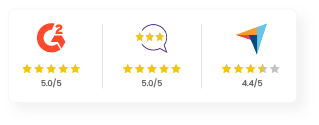12 Ways an LMS Enhances Your Compliance Training

When it comes to compliance training, one of the biggest challenges is engaging employees. Most often, employees perceive compliance training as boring. They may view it as a checkbox exercise, something they have to endure rather than an opportunity for meaningful learning and skill development.
As a result, they may even zone out during training sessions or rush through the material just to complete it, missing out on crucial information and failing to internalize key concepts.
One way of creating engaging compliance training is through a solid L&D program with the help of a Learning Management System (LMS).
In this blog, I’ll talk about how an LMS can take your company’s compliance training to the next level, turning it from a tedious task into training that actually benefits your business, plus gets your team excited!
Types of Compliance Training
Compliance training can be divided into two main categories: external and internal. External training covers laws, regulations, and industry standards mandated by government bodies and international laws. This is crucial because it ensures your company operates within legal boundaries, safeguarding its economic and legal standing. Topics often include occupational health and safety, cybersecurity, DEI and more.
On the other hand, internal compliance training focuses on your company’s specific rules and values. This training is essential for creating a positive work culture and empowering employees to perform at their best. It familiarizes employees with the cultural norms and behavioral expectations within the company. Topics typically include the company’s code of conduct, anti-harassment policies or even data management practices.
Using an LMS for Compliance Training
So, given that most companies have to manage internal and external compliance, it would mean a bunch of compliance assessments to keep track of, usually every year. And let’s face it, there’s zero room for error here. But trying to juggle all that manually? It sure is easy to miss stuff.
That’s where a compliance LMS with alerts, messages and certification and assessment features helps. It eases things out and keeps everything on track.
Let’s look at how an LMS can take your compliance training to the next level.
1. Centralized Information Platform
An LMS is your ultimate toolbox when it comes to compliance training. It brings together all resources – videos, documents, quizzes and more – under one roof. You can forget about sifting through emails or folders because everything you need is neatly organized in one place.
Additionally, LMS platforms bridge geographical gaps. Whether your team is in the office, working remotely, or spread worldwide, they all have equal access to training materials. This ensures everyone stays aligned, no matter where they are.
2. Certifications and Assessments
These play a crucial role in gauging employee understanding and adherence when it comes to regulatory requirements. An LMS helps streamline the certification process by offering automated assessments tailored to specific compliance modules. These assessments not only evaluate knowledge retention, but also ensure employees have been able to comprehend critical concepts and procedures.
The LMS also allows for customizable certification paths, enabling employees to progress through training modules at their own pace while meeting deadlines.
3. Automated Reminders & Scheduling for Retraining
An LMS simplifies the process of reminding employees about upcoming compliance training or retraining sessions. Through automated notifications and scheduling features, employees receive timely reminders about pending training requirements.
These reminders can be customized based on various factors such as training deadlines, certification expirations or regulatory updates. By proactively notifying employees, an LMS helps minimize the risk of non-compliance and ensures that employees stay up-to-date with the latest regulations and procedures.
4. Advanced Progress Monitoring and Tracking
With an LMS, you are not merely giving out information and hoping it sticks. The LMS enables real-time tracking of employee progress. You can monitor who has completed which training, their scores and identify areas where additional assistance may be needed. This is like having a panoramic view of your team’s learning journey.
Moreover, in compliance, staying organized isn’t just a best practice, it is often a legal requirement. LMS platforms simplify this process with automated compliance reporting. They keep track of training completion status and generate vital reports essential for regulatory compliance. With the assurance that your compliance records are consistently audit-ready, you can rest easy.
5. Personalized Learning Experiences
Training isn’t one-size-fits-all, especially when it comes to compliance. An LMS lets you customize your training to match your organization’s unique needs and culture. This tailored approach ensures your team gets the exact information they need, presented in a way that resonates with them.
Moreover, people learn differently. Some prefer reading while others thrive with videos or interactive sessions. An LMS accommodates these diverse learning styles, making learning more effective and enjoyable. This flexibility leads to better engagement and retention of important compliance information.

Streamline & simplify compliance training
- Build a culture of Compliance
- Monitor compliance progress
- Assessments & Certifications
6. Interactive Training for Engagement & Retention
LMS platforms revolutionize compliance training by incorporating interactive modules and multimedia. Instead of relying on traditional, text-heavy methods, they embrace dynamic formats like videos, interactive scenarios, and real-world simulations.
This engaging content keeps learners interested and improves comprehension and retention of complex (often jargon-filled) information.
Additionally, LMS platforms often use techniques like gamification to enhance engagement further. By incorporating elements like quizzes and leaderboards, gamification transforms learning into an interactive experience which makes it all the more enjoyable while reinforcing information.
7. Enabling Updates for Changing Regulations
Keeping track of ever-changing regulations is never easy, but an LMS makes the process smoother. As rules evolve, you can quickly update your training materials in real-time in the LMS and ensure your team always has access to the latest information. This helps them stay compliant and informed, in turn, reducing the risk of regulatory violations.
8. Scalability and Flexibility for Growing Needs
One of the standout features of an LMS is its scalability. Whether you are training a small team or a large enterprise, an LMS can easily adapt to your needs. This scalability ensures you won’t outgrow your training program as your company expands. You will always have a system that grows with you.
Flexibility in scheduling is another seminal advantage of an LMS. Employees can access training at their convenience, whether it is during downtime or after hours. This flexibility accommodates teams across different time zones and individuals with varying schedules, allowing everyone to learn at their own pace without disrupting their workflow.
9. Cost-Effective Training Solutions
Switching to an LMS can lead to significant cost savings compared to traditional training methods. Expenses such as venue rentals, travel costs and printed materials (not to forget costs associated with in-person training) are greatly reduced with an LMS. Training conducted online is accessible from anywhere, further cutting costs.
In the long run, using an LMS results in major financial benefits. It reduces upfront training costs and minimizes the need for repeated sessions due to its more effective training approach. Additionally, there’s all the time saved in training administration and increased efficiency.
10. Better Training Management
An LMS brings efficiency to training management by streamlining the entire process, from course creation to tracking employee progress. This centralized system eliminates the need for coordinating training schedules across multiple platforms.
Moreover, LMS platforms reduce the administrative burden with automation features for tasks such as enrollment, reporting and reminders. This takes the load off L&D and HR, freeing up their time for more strategic tasks.
11. Robust Data Security
At a time when data security is paramount, an LMS offers secure handling and storage of sensitive training records. With robust encryption and secure servers, an LMS ensures confidential employee data and training materials are protected from unauthorized access.
It helps organizations stay compliant with data protection and privacy laws by managing user data according to legal standards.
12. Accessibility and Inclusivity for All Employees
One of the key strengths of an LMS is its ability to provide remote access to training materials. This feature is particularly important for today’s mobile workforce where employees can access training from anywhere, whether they are at home, in the office, or on-the-go.
What’s more, an LMS caters to diverse learning needs and preferences, making it an inclusive tool for workforce development. It supports various formats like videos, text and interactive content, accommodating different learning styles and ensuring all employees have equal opportunities for learning and growth.
Get Enhanced Compliance Training with LMS
By centralizing training resources, improving data security and offering customizable learning experiences, LMS platforms literally take on the old-school challenges of compliance training. They provide scalable, cost-effective solutions tailored to diverse learning styles and administrative requirements, all while ensuring regulatory compliance and data privacy.
For companies looking to level up their compliance training game, investing in an LMS like Enthral isn’t just a smart move– it’s a huge step towards future-proofing your whole training setup.











